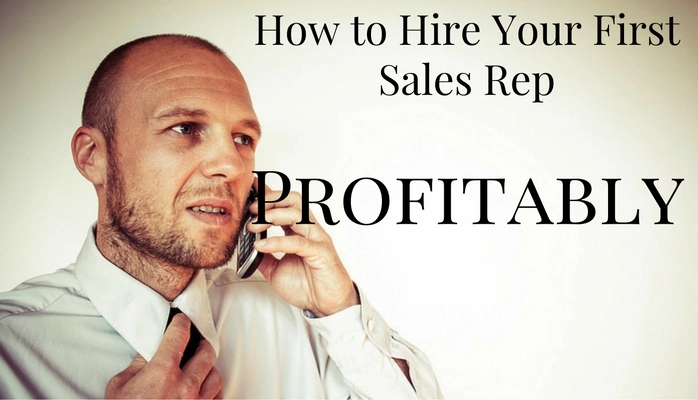
How to Hire Your First Sales Rep…Profitably!
At some point in the growth of all MSPs, IT consultants, VARs and/or software salesforces, the need to hire the first salesperson becomes apparent.
Typically, this is stimulated by one of several factors.
First is fatigue of the founder or principal.
This individual probably did not start the business with a view to being a salesperson, but necessity being the mother of invention turned the founder into a salesperson.
Secondly, the business is booming and the founder(s) would like to pay attention to strategic and tactical issues, as opposed to sales issues.

Last, the decision to hire the first salesperson is because of the mistaken assumption that hiring a salesperson will accelerate the growth of the company.
More often than not, this is a mistake and, according to The Wall Street Journal, an extremely expensive mistake.
They estimated, a few years ago, that a hiring mistake in the high-tech industry will cost a company half a million dollars between current revenue and future revenue.
You see, that poor salesperson literally poisons the market by giving poor, inept and/or outright incompetent presentations regarding their employer’s products and services.
There are several things you can do to get this first salesperson to come on board profitably.
First, make sure that you never hire anyone without having him/her complete online behavior and aptitude evaluations. You’ll find one of each on my website under the Assessments tab. But, I want to know how the person “ticks” through a behavioral evaluation.
I have found that there are basically two kinds of salespeople that operate today. The first are hunters, and the second are harvesters. Hunters are the men and women who are predisposed, as a result of DNA, to go out and find new business. They hate to lose, they’re extremely competitive, and they have high degrees of mental agility, although their academic achievements may not be very great due to a tendency to get bored very easily.
The second group of salespeople are harvesters. These are great people for customer service positions, for maintaining their existing accounts and for serving those accounts, but they will rarely go out and hunt to find new business.
So, if your goal is to grow your business, make sure that you define a hunter, that you have the attributes of a hunter written down and, as these candidates take the evaluations, you should be able to say that the applicant is a hunter or a harvester.
The aptitude evaluation tells me what they know about selling.
I find that many entrepreneurs and founders of small to medium technology businesses don’t have the personal experience in sales required to see through the smokescreens that some salespeople will deliver during the interview process.
As a matter of fact, there is a diametrically opposed relationship between the interviewing skill of a candidate and the selling skill of the candidate.
You see, the worse they are at selling, the more often they’ve been fired and, therefore, the more often they go through the interview process. So, be very careful when interviewing someone who has had a long series of jobs.
Another benchmark that I encourage you to exercise is to verify their W-2.
I have found, and I know this will sound very cynical, that the typical unemployed salesperson made well over $100,000 in their last job. Be careful; this is more often than not a negotiations ploy. Therefore, I encourage you to verify income by requiring all candidates to bring their last three years’ W-2s in for verification with you.
Now, many of the high-tech companies that I’ve coached in the past forty years have products or services that are rather hard for new people to pick up and master.
As a matter of fact, in my case as a rookie at IBM, I spent eighteen weeks of my first year of employment in classes. Most small to medium businesses can’t come close to affording that kind of a training time period.
Therefore, I encourage you to build a plan that calls for the new salesperson to sell something that has the ability to produce margins in a very short sales cycle.
The goal is to get him/her to a level of profitability as fast as possible and/or realize that we’ve made a hiring mistake and they won’t/can’t achieve profitability quickly.
So, do you have supplies that they can sell, service contracts that they can sell; something that is easy for a new salesperson to master, and he/she can then grow into your business. If they don’t have that, then their first job would be to set appointments for the existing sales team and thereby increase the top line, producing enough margin to pay for themselves.
One thing that I’ve found to come in very handy is a transition plan.
This is a plan that calls for weekly inspections of the activities and the proficiency of the new salesperson. Typically, these plans go for sixteen weeks, but they can be longer or shorter, depending on circumstances.
Regardless, make sure the transition plan does not include any dollar objectives. I want to know that they are executing the right activities in the right quantity and quality, so that their proficiency improves.
The best plans call for weekly one-on-ones with the hiring manager, during which the new employee proves – by giving role-plays, presentations, presenting sample proposals they’ve written, et cetera – that they have gained an increment of proficiency that will serve them well, as they become a full-blown outside sales rep.
A combination of these weekly one-on-ones and assignments to selling short-sales-cycle, high-margin products or services will allow you to hire salespeople and have them produce profitable results for you and your company in a very short period of time.
By the way, if they fail to meet any of the weekly objectives, their employment should be terminated. You need to spell that out in the transition plan and show that to the candidate before you extend a job offer.
If you’d like to talk about any other hiring ideas, please feel free to click the link and set an appointment in my calendar. And, if you’d like to get a complimentary copy of my Guide to Hiring Sales Superstars, click here and just say send me the book; and I will send it over to you right away.



